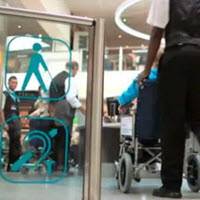All You Need to Know About The PRM Charge
- Written by Roberto Castiglioni
 Often referred to as the elephant in the room, the PRM charge helps to ensure that persons with disabilities can travel easily and safely around Europe, as it covers the cost of assistance at airports and within airports such as wheelchairs and more. However, not many people are familiar with all the details and implications of the PRM charge, so this article aims to explain exactly what it is and how it is set.
Often referred to as the elephant in the room, the PRM charge helps to ensure that persons with disabilities can travel easily and safely around Europe, as it covers the cost of assistance at airports and within airports such as wheelchairs and more. However, not many people are familiar with all the details and implications of the PRM charge, so this article aims to explain exactly what it is and how it is set.
The charge is a levy paid by airlines to airports and is calculated on the basis of all departing passengers.
The law (EC1107/2006) states that “This specific charge shall be reasonable, cost-related, transparent, and established by the managing body of the airport in cooperation with airport users, through the Airport Users Committee where one exists or any other appropriate entity. It shall be shared among airport users in proportion to the total number of all passengers that each carries to and from that airport.”
In any case, setting the charge is no easy task, and in fact, often involves painful discussions behind closed doors between airlines and airports.
The London Heathrow Example
For the sake of this article, we have taken 2022 data from London Heathrow Airport. The Heathrow PRM charge for the period 1st January – 31st December 2022 is divided into three tiers:
- Category 1 – at 65%+ pre-notification at 36 hours shall be £1.12 per departing passenger.
- Category 2 – between 50% and 64.99% pre-notification at 36 hours shall be £1.32 per departing passenger (consisting of £1.12 base price + £0.20 supplement).
- Category 3 – less than 49.99% pre-notification at 36 hours shall be £3.23 per departing passenger (consisting of £1.12 base price + £2.11 supplement). (Data source: Heathrow 2022 Tariffs)
Tiers were created to reward airlines with a high volume of pre-notified reservations and to penalize those with a lower percentage of pre-bookings for assistance. There must be a higher charge to cover the costs arising from having to deploy agents only on forecasting models, which often results in poor management of the available resources.
To have a clearer understanding, we have made a (rough, unscientific) calculation for you: For the first six months of 2022, Heathrow had 26.071.870 passengers. We then divide the figure by two as the levy only applies to departing passengers, and our estimation is based on Category 1 pricing only. The sum raised towards the PRM charge is about £14.600.000. The actual figure should be higher as not all airlines fall in the Category 1 pricing bracket.
Funds are used to hire assistance agents, buy tools (like wheelchairs and other items), and pay for disability awareness training.
Why the PRM charge causes friction between stakeholders?
The levy is determined by historical data, including the number of requests for assistance over the previous twelve months, and is adjusted by forecasting models based on foreseeable increases in requests. Forecasting models have not always been accurate. In fact, the growth of the PRM segment outpaces the growth of other passenger segments, leading to the need to realign charges during the year.
Airlines, for their part, do not favor these mid-term cost increases and leave airports and their service providers in the precarious position of having to generate savings to the detriment of customer service quality.
Is there a solution in sight?
In a simple word, no. It is extremely likely that the PRM charge will remain a cause for lively debate between stakeholders. Yet, there are ways to mitigate the impact of the ever-increasing penetration rate of the PRM segment on the overall cost structure.
Best practice from a handful of European airports shows that operators can drive efficiencies and improve the quality of service. There are in fact an array of quick wins that can ease the relationship between the airport and its airlines. We are just an emailaway to discuss your challenges and help your operation achieve the best possible outcome.










